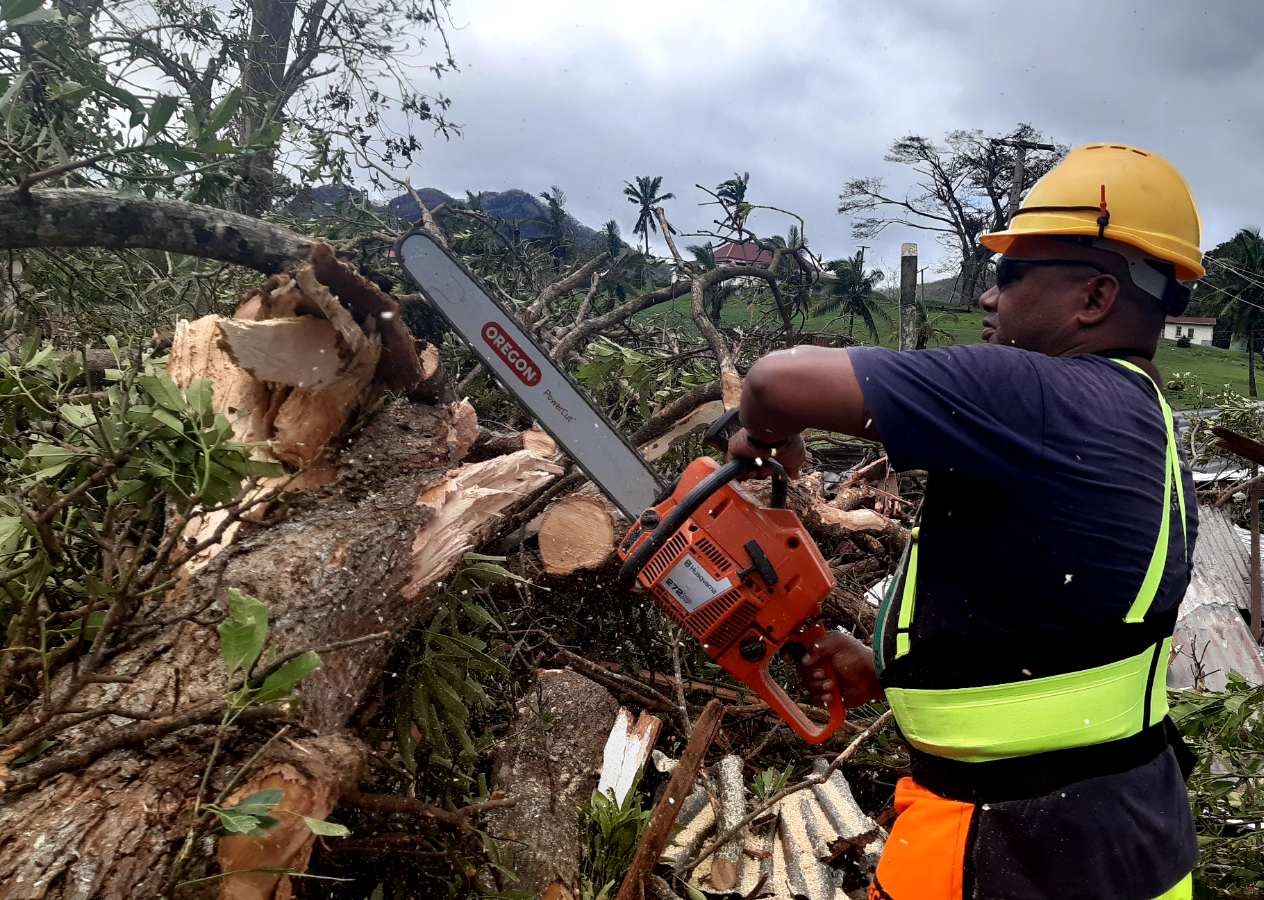
Forestry Chainsaw Skills Critical Prior to and After Cyclones
Staff
from the Ministry of Forestry have been on full cyclone operations mode since
Wednesday attending to eleventh-hour calls from the public to trim trees that
are a threat to lives and property. They worked in collaboration with the
National and Divisional Disaster Management offices and both the Fiji Roads
Authority (FRA) and Energy Fiji Limited (EFL).
Forestry
Executive Director Operations Manasa Luvunakoro said the combined efforts
complement the work of the EFL which has an ongoing programme trimming trees
that obstruct electrical lines.
“So,
most of the requests coming in prior to the cyclone were to do with trees near
to residences and infrastructure,” he said.
“We
deployed teams with chainsaws and I am thankful that they were able to attend
to the calls from the public prior to the cyclone. From yesterday morning,
following the passing of Severe Tropical Cyclone Yasa, our teams worked in
collaboration with the Fiji Roads Authority to clear fallen trees mainly on the
road sides.
“In
Vanua Levu, for instance, our teams were deployed immediately after the winds
subsided to help clear the road to Savusavu and towards the Natewa Bay. They
continued until late yesterday afternoon, under the watchful eyes of the
Minister for Forestry Honourable Osea Naiqamu who is currently in the North.
“We
have requested for more chainsaws and will be deploying more teams from Viti
Levu to Vanua Levu especially to help clear the roads in Bua where the brunt of
the cyclone was felt on Thursday night.”
He
said the teams in the Western Division started clearing trees from 3.00
O’clock yesterday morning.
“Ideally,
as part of our proactive measures, members of the public are requested to
assess their environment months before the cyclone season and alert the
National Disaster Management Office or the Ministry of Forestry. Our teams will
prefer to trim trees in good weather as opposed to when the winds have started
to pick up just prior to a cyclone striking. Sometimes, we cannot cut trees
during this time as it poses a threat to the lives of our staff. So it is advisable
for the public to inform us well in advance of the cyclone season,” he said.
Notwithstanding
this, our teams have always known that we will be heavily engaged prior to and
immediately after a cyclone. It is a task our teams look forward to do
especially sharing their unique skills that involves tree-climbing using a
harness and the use of chainsaws. Both are high risk activities that require
proper training to reduce the risk to the tree climber and chainsaw operator,
and the public.
“Yes, we have had incidences where people cause more damage to property and even lose their lives when they are not careful while using a chainsaw,” he said.
He
said the Forestry teams also enjoy trimming trees with the knowledge that this
will help save lives and property.
In
addition to using their tree-climbing and chainsaw skills prior to and after
cyclones, the Ministry is also deploying staff and resources as part of a
whole-of-Government approach to dealing with natural disasters.
With
the passing of the cyclone, our focus now is on assessing the damages it has
caused. We will be deploying drones and vehicles to assist the national and
divisional post-disaster needs assessment operations.
Mr.
Luvunakoro also said that the Ministry will be on standby to also continue its
housing rehabilitation work in the areas of need.
Following
Tropical Cyclone Harold in April, the Ministry deployed staff and machinery to
the islands in the maritime zone.
Minister
Naiqamu said in Parliament last week that Forestry is currently leading the
charge in implementing Government’s commitment to housing rehabilitation in the
islands.
“In
30 weeks, we managed to re-purpose fallen trees into approximately 400 housing
structures in the islands of Kadavu, Vatulele, Matuku, Totoya, and Ono-i-Lau,” he
said.
Mr.
Luvunakoro said that the housing rehabilitation work is ongoing and it looks
like it will continue with Severe Tropical Cyclone Yasa.
“We
have to accept the fact that cyclones are almost an annual occurrence in our
part of the world, so it important to be proactive prior to the cyclone season,
and to still be able to help after any cyclone,” Mr. Luvunakoro said.
“I
would like to thank all the staff who braved the weather to use their skills to
save lives and property, and to help with rehabilitation efforts,” he said.